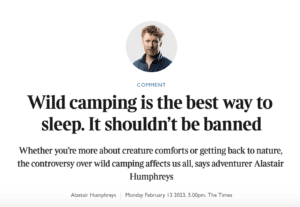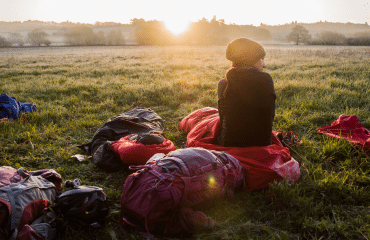
Camping. What does that word mean to you? A shudder of horror and on to the next idea? Perhaps it calls to mind nostalgia for carefree family holidays and glamping with hot tubs and fairy lights, mixed with memories of sleepless school trips and soggy festivals. And what about wild camping, the purest form of the activity, devoid of designated sites and prior booking?
The controversy over wild camping on Dartmoor — the legal case and the subsequent protests — has brought the subject to the fore again lately. Dartmoor was the last place in England where wild camping was still possible without the consent of a landlord, but a High Court ruling put an end to that. Reactions to the ruling — now the subject of a challenge — show that I’m not alone in thinking it would be a sad day if spontaneous wild camping in England really were no longer legal.
My personal memories include sea kayaking with a friend to an inaccessible cove in Cornwall and pitching a tent beyond the reach of a rising tide; swinging in a hammock in a wood near London and listening to the dawn chorus; and waking at sunrise in a bivvy bag, miles from anyone on a Yorkshire hilltop. Each of those experiences was enhanced by fresh coffee brewed on a tiny gas stove, and the satisfying simplicity of quickly packing away my gear into boat, bicycle pannier or rucksack and leaving no trace that I had ever been there except for footsteps in the sand or a crumpled patch of grass. This is wild camping, and it is my favourite way to sleep.
I wild camp for pleasure, and sometimes when I’m away for work, I swap the forgettable three-star business hotel for a memorable microadventure under millions of stars. I have done this all over Britain and in countries around the world. I arrive late and leave early so nobody knows where I’ve been — and nobody minds. I always try to depart carrying more litter than I arrived with, making a positive impact on the landscape.
Part of the reason for discretion is that in England, wild camping — with the exception until recently of Dartmoor — is technically not allowed without permission from the landowner. It seems silly to have to ask someone to sleep under the stars though, so I never do, whether I am in Dartmoor or anywhere else in England. Wild camping requires no planning or pre-booking and, in my opinion, causes no harm. I treasure it as an escape from the norm, for its closeness to nature, and for its sense of adventure and fun.
It is important to distinguish wild camping from what is known as “fly camping”. This involves driving somewhere beautiful with tents, cool boxes and chairs, blasting music, lighting barbecues, knocking down fences, hanging dog poo bags from trees and dumping litter. Fly camping infuriates me, and it also saddens me that people are so disconnected from nature that they feel no responsibility to take care of it.
Those of us who enjoy wild camping are an unobtrusive, quiet bunch who avoid crowded beauty spots, so it has been a surprise to see the argument regarding wild camping on Dartmoor hit national headlines in recent weeks.
To recap: Alexander Darwall, a millionaire hedge-fund manager and land owner, successfully challenged in the High Court the longstanding tacit understanding that wild camping on Dartmoor was permitted on common land without the landowner’s permission. It is a tradition that has been enjoyed by generations of schoolchildren, adventurers and wild campers. Darwall, who uses his 4,000-acre estate for pheasant shoots, complained that his land was “increasingly under pressure from fly campers, litter, raves and so on”. Nobody would disagree that all those things damage fragile environments and threaten biodiversity. Whether they damage the landscape more than pheasant shooting is another matter.
The Dartmoor National Park Authority is appealing against the court decision and its effect on wild campers whom, I would argue, are considerate, low-impact nature lovers. Much is uncertain at the moment, but the solutions being bandied around, involving restricted camping zones and payment to the relevant landowners, are unsatisfactory backward steps.
In reality, this Dartmoor dispute will have very little impact on very few people. The reason it has raised such emotions is that it highlights a larger problem of how restricted access is to wild places in England as a whole. While Scotland enjoys a successfully implemented Outdoor Access Code that gives people a right to roam responsibly, and much of Scandinavia enshrines every person’s right to roam, forage, swim, paddle and wild camp, in England only 8 per cent of the countryside is open-access land.
There is both injustice and absurdity in our being excluded from almost all our wild places. We have an excellent network of footpaths, but they are mere threads across the beautiful canvas of our country. A Public Right of Way is literally that: a right to make one’s way from A to B, with no right to do anything else along the way. Heaven forbid that should include lying down and sleeping.
When people cannot access nature, they cannot connect with it, and will not engage with the biodiversity crisis caused by the way we treat our landscape. If people do not care about nature, or feel a connection and responsibility towards it, then of course a few will be more inclined to drop litter and leave gates open. Nature remains such a low priority to the government that according to campaigners, less than £2,000 a year is spent promoting the Countryside Code and educating people how to act responsibly in the great outdoors.
It is almost 20 years since the passing of the enlightened Scottish Land Reform Act, so the Right to Roam campaign is asking people to back its new Starry Starry Fortnight initiative by wild-camping responsibly, peacefully and leaving no trace this February half-term. In its view, wild camping is free, simple, timeless and harmless, and everyone should be able to enjoy, share and care for the wild places that are important to us.
This piece first appeared in The Times.



Comments